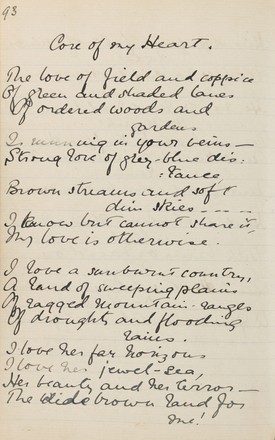Core of my heart
1908
Manuscript,
Permanent loan from the Estate of Dorothea Mackellar, 1970
MLMSS 1959 / Box 16 / Item IV / C
Dorothea Mackellar wrote her first draft of ‘Core of My Heart’ in London around 1904, when she was 19 and homesick for Australia while travelling with her father. The poem was originally published in the London Spectator Magazine in 1908, but Mackellar rewrote it several times before it was published in Australia in 1911 in her first book, The Closed Door. She also changed the words in later recordings of her reading the poem.
Mackellar 'never professed to be a poet. I have written – from the heart, from imagination, from experience – some amount of verse'.* Following The Closed Door, she continued writing poetry and published several novels, but wrote very little after her father’s death in 1926.
About the manuscript
This slim bound volume documents the young Dorothea
Mackellar’s literary output in her breakthrough year, and includes the only
known manuscript version of the first draft of her most iconic work, 'Core of
My Heart' (later ‘My Country’), Australia’s best loved and most quoted poem.
The 'Core of My Heart' manuscript is unusual in that it records
the poem exactly as it was originally written down by the author, who is known
to have worked up her initial ideas, revising the text of her poems in letters
to family and friends, before transcribing a ‘clean’, final draft of her work
into poetry notebooks like this one, compiled chronologically each year. This
volume, ‘Verses 1907-1908’, is particularly significant as it contains a unique
archive of the poet’s creative output during this important year in her
literary career.
Mackellar made revisions to ‘Core of My Heart’ prior to its
first printing in The Spectator (5
September 1908, p.7) in which minor alterations to several lines in the second
stanza are apparent. She continued to refine the text of her poem, including
changing the title to ‘My Country’, resulting in slightly different versions
appearing in subsequent re-printings of the poem.
The impact of the debut of this work on Australian literary
culture was immediate, and ‘My Country’ found its mark with readers of all ages
and levels of society, fanning nascent nationalism in the post-Federation and
pre-war eras. Through this single literary work, generations of Australians
have come to cherish the poem’s lyrical expression of the author’s relationship
to, and love of, the land, as well as her articulation of pride in her identity
as an Australian.
In the 21st century, ‘My Country’ remains in the collective
consciousness of Australians. Resilience in the face of natural disaster, as
described in Mackellar’s iconic verse, has come to be seen as part of the
Australian national character.
Chapter 1: The tenderfoot
‘He’s the rawest thing I ever came across,’ said Bob Hammond.
‘Oh, not raw,’ objected his sister. ‘That always sounds – rough, and this child isn’t – it would be better if he were, considering the sort of life he means to lead. And yet I suppose he is rather like an un-cooked young lettuce.’
‘He’s not fit for the Argentine, anyhow. He believes everything you tell him, and he’s afraid of his horse ––’
Bob’s partner spoke from the other side of the hearth with a sort of contemptuous pity. ‘Well, I don’t wonder much. You scared the life out of him last night with your rough-riding yarns. I wasn’t surprised that he thought old Susan was going to break his neck every time she curtseyed to her shadow going down the track. Anyone can see he has never ridden – just as you can see he comes from a private school. It’s written all over him. But he’s not a bad little sort.’
‘I can’t imagine why he came here, though,’ said Katharine. ‘He said he wanted to buy a farm up-country when he had some experience, poor dear! It will take him a million years to learn even the way they talk; and, poor little thing, he’ll starve. He’s what you’d call a youth, isn’t he? I always hated that word. He says he has been in the country three weeks. Why, I was more at home than that in three days …’*
From Dorothea Mackellar’s first novel, Outlaw’s luck, 1913
Footnotes
* written with ‘Ruth Bedford of “The Little Blue Devil”’, published by Mills and Boon



 Back to list
Back to list